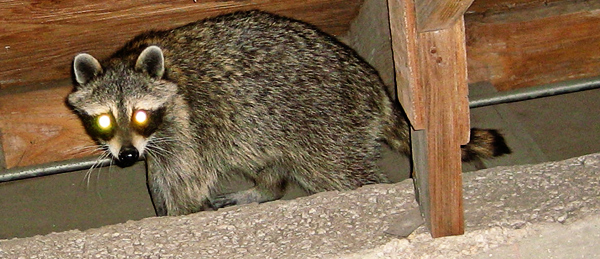- info@wildlifeanimalcontrol.com
Call us for help in your town
Wildlife Control Education
Are raccoons able to raccoons swim?
Researches have shown that raccoons can swim at
an average speed of about 5 kilometers an hour,
and can remain inside water for several hours.
Raccoons have also been found to enter swimming
pools of private buildings, and can remain in
the pool without anyone noticing. It is also
believed that raccoons can become very nervous
inside water, and that is because their body
weights can be as much as 2lbs and they don’t
have find or physical features that can
stabilize their body inside a flowing water.

When raccoons swim, they don’t do so
intentionally, they do so in order to catch
fishes or some other sea animals or they are
running after a predator. Raccoons can quickly
attach themselves to objects located within
streams (including tree branches and rocks), can
find their ways out of water easily. Raccoons
originally live in deciduous forests and
mountains, however, they have migrated to marshy
areas and places close to coastal regions, and
thus, they had to get some swimming skills in
order to catch insects and sea animals in the
sea and streams, especially in urban areas.
Raccoons can crawl, and stand in water, and the
development of their claws even makes it easier
for them to grab water animals at an incredible
speed. Male raccoons are generally heavier than
females, and during the spring season , both
male and female raccoons can swim faster , but
they hardly move near the water in the winter
season- this is the season when they temporarily
hibernate. Though the bodies of raccoons can
vary with habitat, most of the raccoons found in
urban areas do have bodies that can withstand
strong water torrents, especially when they are
swimming.
Raccoons can swim under water at depths of about
5 feet, their breathing mechanisms are developed
in such a way that they can survive under water
with little or no oxygen, for several minutes,
unlike humans who can barely survive without
oxygen for over 1 minute. The skin of raccoons
comprises of more than 85% of fur or coat, and
that makes it easier for the animal to swim even
in extremely cold weather. Raccoons use their
skin as extra insulator during temporary
hibernating periods, and with the extra storage
of fats from food ingested during the spring and
summer, raccoons can easily stay with less food
during winter seasons.
Raccoons can swim for a long time inside water;
however, they cannot live inside water.
Go back to the How to
get rid of raccoons home page.
Need raccoon removal in your hometown? We service over 500 USA locations! Click here to hire us in your town and check prices - updated for year 2020.

















